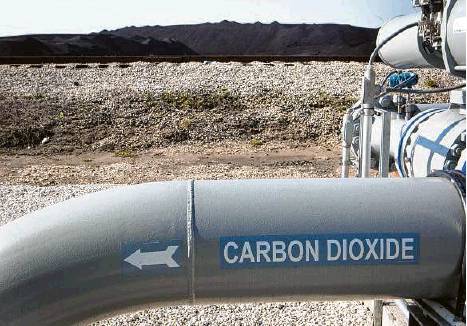Commentary
Texas biz must speak on climate change
CHRIS TOMLINSON
Houston proclaims itself the Energy Capital of the World, but as the world moves away from fossil fuels, that title could shift elsewhere.
Oil and natural gas give the Texas economy its edge, so to remain strong in a future where hydrocarbons are severely taxed and regulated, the state’s most essential industries should transition to fight global warming.
“This city has the opportunity to be the global leader in developing and applying the technology that’s going to create a solution to a problem that we’ve created throughout the industrial age,” said Bob Harvey, CEO of the Greater Houston Partnership, the region’s chamber of commerce.
“We have the skill, we have the intent, we have the access to capital. We have all of the things we need to be the leader in solving this problem,” he told the 2019 Low-Carbon Energy Summit, studiously avoiding the term climate change. “I think what we haven’t yet done is commit ourselves as a community to that task.”
No kidding.
Five years ago, Texas energy executives discussed global warming in either hushed tones or loud echoes of irresponsible political slogans. Acknowledging climate change was uncool when conservative politicians like Gov. Greg Abbott, and later President Donald Trump, were providing political top-cover for the industry responsible for it.
Climate change denial, though, is no longer an option now that people are suffering the consequences. Polls show that Texans no longer question global warming. They expect action.
The top brass at international oil companies, including Exxon Mobil and Royal Dutch Shell, have publicly promised to reduce emissions, calling for a carbon tax that would encourage the private sector to develop market-efficient solutions.
Harvey said many of these companies have been working on climate change mitigation technologies for years; they just don’t talk about them. Probably for fear they might have to mention the global crisis they spent even more years ignoring.
“We need to deal with the fact that Houston, throughout this process, will likely be seen as perhaps not being totally committed when indeed we are,” Harvey said.
The summit, which was organized by the Center for Houston’s Future, suggested that Texas should become the epicenter for climate change mitigation. After all, the state is the largest greenhouse gas emitter in the country, and if companies here develop tools to capture emissions from wells, pipelines, refineries and petrochemical plants, they can export those technologies for cash.
So far, not so good. Shell recently launched a New Energies division, but not in Houston.
“The talent for that division is difficult to attract, so they based it in San Francisco,” Andy Steinhubl, leader of the U.S. Energy and Chemicals Strategy Group at consulting firm KPMG, told executives. “You ought to be thinking about that.”
A few days later, I listened to Tip Meckel, a research geologist at the University of Texas Bureau of Economic Geology, pitch hydrocarbon plant operators in Port Arthur on the potential to capture carbon in empty wells. He’d done the math on a carbon capture tax credit nicknamed 45Q, and he figured petrochemical plants could make hundreds of millions of dollars.
“All you have to do is start your project by 2024,” Meckel, an internationally recognized expert on carbon capture, said. “These numbers are attractive enough that we are beginning to get a lot of attention and thinking about how to do these kinds of projects.”
When an executive observed that Meckel had not once used the term climate change in his presentation, he joked: “Now you’ve done it.”
The only reason to reduce carbon emissions, along with methane and other greenhouse gases, is to keep the planet from warming more than 2 degrees Celsius. If we break that threshold, life on Earth will never be the same and much more difficult.
Lately, people who care about climate change have adopted a strategy of talking around the topic, believing they can win support for new policies as long as they don’t utter atrigger phrase, such as global warming. But if Texas leaders cannot bring themselves to say the words climate change in front of an industry audience, it begs the question, why bother?
Meckel could know everything about the potential of underground caverns, and scientists at Rice University could perfect new ways to generate hydrogen. Methane detection companies could identify leaks down to the square foot. But Texans will never lead in solving a problem they are afraid to name.
The economic health of the region relies on the energy industry evolving, but so far, executives are focused on making money the old-fashioned way. The impetus for change remains too weak, inertia is too strong and the courage to speak the truth is wholly inadequate.
Tomlinson writes commentary about business, economics and policy. chris.tomlinson@chron.com twitter.com/cltomlinson

